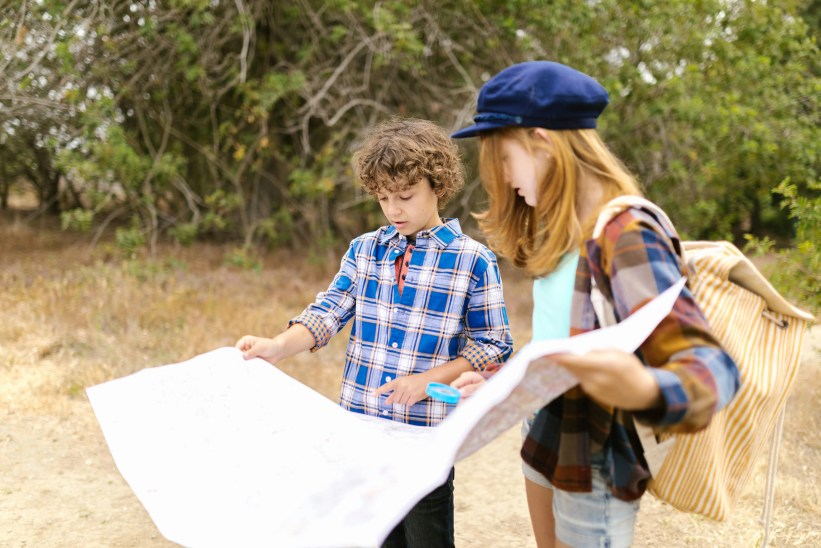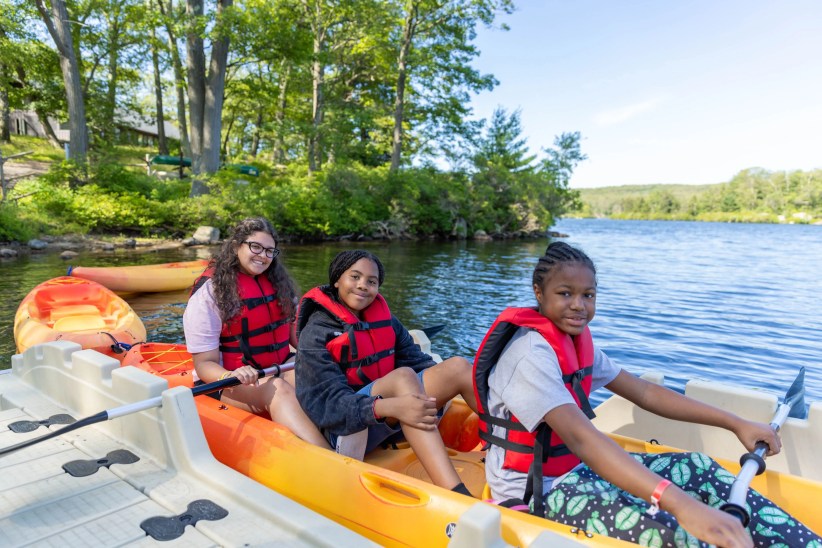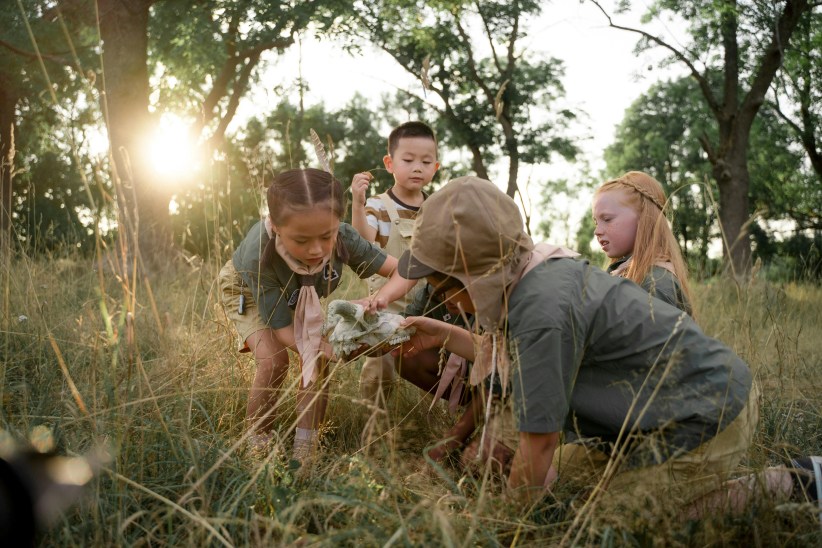
PLEASE NOTE: The city’s biggest Camp Fairs are coming up on Saturday, March 28, and Sunday, March 29, in Manhattan. For families with children ages 3 to teen, the Camp Fairs are free, child-friendly, and feature both Day Camps (in and around the city) and Sleepaway Camps (all over the Northeast). CLICK HERE for details and to register.
While summer camp is a place where children learn new activities like swimming, zip-lining, or mastering their tennis forehands, camp is also an environment where tolerance, good values, and citizenship are encouraged and fostered. Camp is a unique environment where professionals are dedicated to creating a community that cultivates character, compassion, and the notion of citizenship.
Summer camp is a community. Campers and counselors eat meals together, share in camp traditions and rituals, take part in activities together, and at overnight camp, live in bunks together for weeks at a time. Campers and staff become like family. For the majority of campers, being at summer camp is the first time they have lived with or eaten every meal with a group of people other than their family.
“Summer camp, and in particular overnight camp, is an incredibly powerful laboratory for character-building. Campers are placed together with children from different communities, cultures, or even countries, and asked to live together peaceably,” explains Jason Sebell, director of Camps Kenwood & Evergreen, brother-sister camps in Wilmot, NH.
Scott Reich, a New York attorney who serves on the board of several charitable organizations and is the author of The Power of Citizenship: Why John F. Kennedy Matters to a New Generation, spoke at the American Camp Association, NY and NJ’s ( ACA, NY and NJ) Tri State CAMP Conference for camp professionals this past March about active citizenship in the camping experience.
“At summer camp, children are uniquely positioned to explore who they are and to learn about how they can and should relate to one another. Accordingly, a pivotal mission of the summer camp experience should be to foster a dynamic culture in which children learn values to guide them through life,” he says. “This is critical because having an understanding of community and teamwork are key ingredients for developing good citizens in a society in dire need of them, and therefore the future of our country depends in part upon our ability to instill in young people the sense that they belong to something bigger than themselves.”
Year-round camp professionals spend 365 days a year focusing on the social and emotional development of children, and when summer arrives, they provide intensive staff training for counselors, which includes anti-bullying techniques as well as practices for empowering children to be supportive, respectful and tolerant of each other. “Encouraging tolerance and good citizenship is at the foundation of everything we do,” says Gregg Licht, director of Elmwood Day Camp in White Plains, NY. “It’s immersed in our program and starts at staff training. We not only train our staff with how to work with children and on camp safety, but how to experience our culture. They get to understand how children need to be welcomed and cared for at camp. Children learn directly from staff so when they are treated with kindness and compassion, they begin to get a sense of how to treat other people.”
If disrespectful or hurtful behaviors occur between campers, counselors are there to talk to the campers and make it a teachable moment, unlike in a classroom or school when sometimes these behaviors can go unnoticed and unresolved.
At many camps, the teaching of tolerance and good citizenship is built into the program. Camps Kenwood & Evergreen do a number of rituals that promote tolerance, understanding and acceptance among each other. “We do a social contract on the second day of camp where we ask each cabin to sit down for a discussion facilitated by the bunk counselors. We ask each camper to talk about how he or she wants and doesn’t want to be treated in this group setting,” Sebell says.
“Discussions include talking about sharing, teasing, eye-rolling, apologizing, foul language, how chores are divided, and caring for one’s belongings. After everything is discussed and processed, they create a list of behaviors they all agree on and sign it like a contract. This social contract becomes the foundation for all behavior in the bunk. Instead of it being imposed by the camp directors, it is an intentional document that every camper has input on. This contract is just one of the ways we teach acceptance and good citizenship.”
Elmwood Day Camp has a set of eight goals for every camper, called Magic 8. “The goals are a large part of our camp program and include being kind, make a friend and be a friend, and connecting to a group leader (adult) which all promotes tolerance and being a good citizen,” Licht says. “These goals are posted around camp and each week, counselors look at the goals for each camper and report on how each child is doing with each one.” Elmwood also has a program called Group, which is a weekly theme that supports Magic 8.

“There is an activity that surrounds the theme each week, such as a friendship circle, where each camper writes or draws something positive about each child in the group,” Licht explains. “Through this exercise, each child gets a piece of paper with something nice about them. Children also learn that you may not always like every child, but you can always find something positive about them. And once you find the positive, you see people in a different light.”
Many camps hold community service projects over the summer, such as swim-a-thons for not-for- profit camps, performing for local senior centers, and painting old buildings in the community. “Community service promotes the idea of good citizenship and the fact that we belong to a community larger than ourselves, which comes with responsibility,” comments Renee Flax, director of camper placement for the ACA, NY and NJ. Other community service projects include volunteering in local soup kitchens, painting old buildings, making crafts for sick children in the hospital, collecting goods for people affected by a natural disaster, walking for a cause, and sending letters to stationed soldiers. Through these projects, camp professionals are teaching children the importance of giving back to the community, and that even the youngest people can make a real difference in the lives of others.
“Camps can encourage children to get involved in their communities by introducing them to various local service opportunities over the summer,” Reich says. “Whether it’s starting a recycling program, doing volunteer work at a local hospital, working in food pantries and soup kitchens, or embarking on letter-writing campaigns to thank our brave troops, the key is for kids to be exposed to the many ways they can touch peoples’ lives and make a difference. When the summer concludes, camps can give kids recommended ways for getting involved in their own communities which replicate their efforts from over the summer, thereby encouraging a sustainable and well-rounded approach to service.”
“Quite simply, people are less accepting of differences when they feel disconnected from each other,” Sebell adds. “The epidemic of teen cyberbullying shows that it is far too easy to pick up a device and type something nasty without thinking at all about the other person’s feelings. As parents and educators, we need to figure out how to teach our young people to feel empathy for others, including people that they don’t know. One of the best ways to teach empathy to a child is to give them access to an intentional, values-driven community like a quality camp.”






















